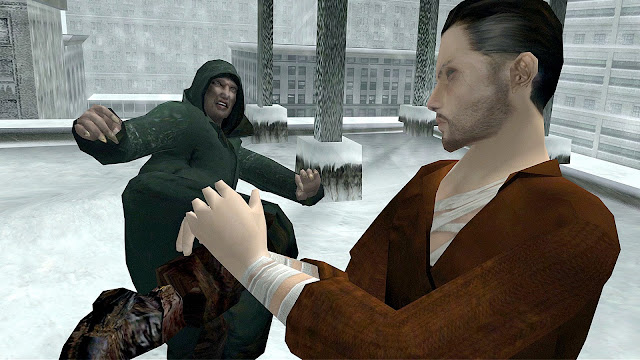 |
| One strange adventure. |
Indigo Prophecy (or Fahrenheit in Europe) is an adventure game developed by Quantic Dream and released back in 2005. Following the story of a man framed for a murder while possessed, and the detectives out to get him, Indigo Prophecy was one of its era's most interesting games. That's mainly due to its bonkers story and flurry of quick-time-events, a mechanic that was getting popular at the time. The game received an HD remaster in 2015, celebrating its 10th anniversary for modern systems. I've read mixed opinions on Indigo Prophecy over the years, so it's always been a game I was interested in checking out? So is the game any good?
A thriller centring on Lucas Kane, an ordinary man whose life gets thrown into chaos when one night, he ruthlessly murdered a man after being mysteriously possessed. He also gains new powers and abilities, which lets him see cryptic visions from the future, as he tries to find the reason for his involvement. At the same time, we follow detectives Carla Valenti an Tyler Miles, who are investigating Lucas' murder in an effort to arrest him. Being a game with multiple choices and decisions, each character can influence the others' story based on the actions you take in their routes, resulting in multiple endings for the leads.
 |
| Lucas is in the adventure of his life. |
As for the story itself, it started off strong with the opening, slowly building its cast and reeling you into its setting, then goes all-out supernatural with Mayan rituals and the occult, which was a huge tonal shift from the thriller mystery. It didn't help that the final act kept introducing new characters without explaining them properly, making things hard to follow. Worse yet, the finale was rushed, ending anti-climatically and vaguely teasing a sequel. And while the characters like Lucas, Carla, and Tyler were good, the villains were just plain forgettable.
An adventure game, you control the characters as they explore their srroundigns, interact with objects, solve puzzles, and talk with NPCs in each chapter. You'll often be bombarded with quick time events in some segments, forcing you to quickly tap the input and shoulder buttons successfully. Get used to this as the game has a tendency throw in a bunch of QTEs in the most mundane ways possible like in a cutscene with no gameplay at all. Strangely, Indigo Prophecy features a fixed camera angle similar to classic Resident Evil games and aside from looking cinematic, it was tedious to navigate with and constantly having to re-center my character. A normal camera would've worked just fine here. You also have a stress level meter, which displays your character's current mental state. Having it at mid to high level will keep them in good spirits, while will having it at low will result in a 'Game Over'. Admittedly, it was a neat mechanic.
 |
| There's plenty of choices to make. |
The game's QTEs can range from performing simple tasks to playing basketball in freezing cold to fist-fighting in mid-air like in The Matrix. A Google Chrome-like grid will show you the inputs you'll need to press and to say that the QTEs were annoying would be an understatement. Some can drag on for minutes with you quickly pressing inputs or you'll die, costing you a life. Losing all lives will have you restart the segment again, making it a pain to put up with. Truth be told, I haven't been this much exhausted from QTEs since Shenmue II. Indigo Prophecy took around seven hours to beat, and in terms with replay-value, it's surpringly good. The branching paths and choices will make you interesed in taking a different choice and see how it pans out. There's also hidden cards in chapters that lets you unlock some behind the scenes footage and mini-games, which were nice to watch.
 |
| You'll either love or hate the game's many QTEs. |
Being a remaster, the game is presented in full-screen with slightly polished visuals-- it's still an old PS2 game and its age is showing. Apart from the main characters, the character models and backgrounds were average. I liked the voicework, which was great and packed fantastic performances all-around, especially from Lucas, Carla, and Tyler. The soundtrack was good and compliment the game's gloomy premise well, with the main theme and ending theme by Theory of a Deadman being standouts.
 |
| The game holds up decently all things considered. |
Overall, I can see why Indigo Prophecy was a polarizing game since it had promising concepts but the execution was clumsy. It started off strong with a mysterious story, but quickly went nonsensical with its supernatural themes and rushed third act. The gameplay was serviceable though wasn't fun given the amount of QTEs thrown at you, often distracting you from the action. The presentation was decent, with the voice acting being great. Having said all that, I found it engaging enough to warrant another playthrough in the future. If you can put up with its issues, Indigo Prophecy is worth a look if you're looking for a story-driven game.
Comments
Post a Comment